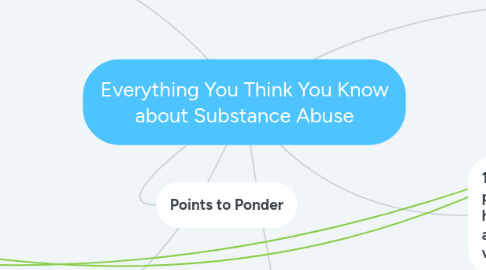
1. "The Addiction Paradox"-Bruce Bower
1.1. introduces the conflict of the nature of addiction. eg Brain disorders vs addictions
1.2. introduces the ideas that addiction is a changeable habit and can be abolished through maturation.
1.2.1. supports this idea via psychologist Charles Winick who conducted studies which he then concluded that people "mature out" of addiction following growth, responsibility and bodily damage caused by use
1.2.2. introduces supporting facts from psychologist Gene Heyman who expanded on Winick's ideas to concluded that people conquer their addictions at all ages, not just during young adulthood, as Winick thought.
1.2.2.1. "Heyman's findings, published in the 2013 Annual Review of Clinical Psychology, build on an argument he made in a 2009 book, Addiction: A Disorder of Choice. Everyday decisions influenced by deeply held values and goals push people toward or away from addiction"
1.2.3. introduces that although addiction is a changeable habit, addicts cannot go the road to recovery alone, as they require healthy connections to achieve recovery.
1.3. introduces and supports than anyone can break free from addictions.
2. Points to Ponder
3. 2. How does this article align (or not) with the previous page's TED Talk?
3.1. The Addiction Paradox and Johan Hari's TED talk align immensely, they both support that environment,maturation,social capabilities have major influence on what forms an addict as well as the road to recovery.
4. Johann Hari TED Talk
4.1. introduces theory of "disconnection is major driver of addictions"
4.1.1. Supports these ideas with study conducted called "Rat Park" where researcher Bruce Alexander separated rats into 2 cages, one stimulating and one isolating, then introduced morphine in order to track a consistency in addiction rates.
4.1.1.1. "Addiction isn't you, it's the cage you live in" The results from this study found that the Rats that were stimulated within rat park, but also given the option of normal or drug laced water, did not choose the water simply because they were stimulated by their environment.
4.2. supports ideas also with facts from Vietnam war where 20% of the American army used heroin, but when deployment ended were not addicted as their environments improved.
4.3. introduces statistics regarding Portugal and the scientific study regarding addiction, thereafter conducted. In 2000 1% of Portugal's population is addicted to drugs
4.3.1. The political and scientific study conducted, was the decriminalization of all drugs as well as programing to re-connect addicts to society as apposed to punishing them or giving harsh ultimatums.
4.3.1.1. Resulted in a drastic decrease in drug use, crime rate and addiction overall
